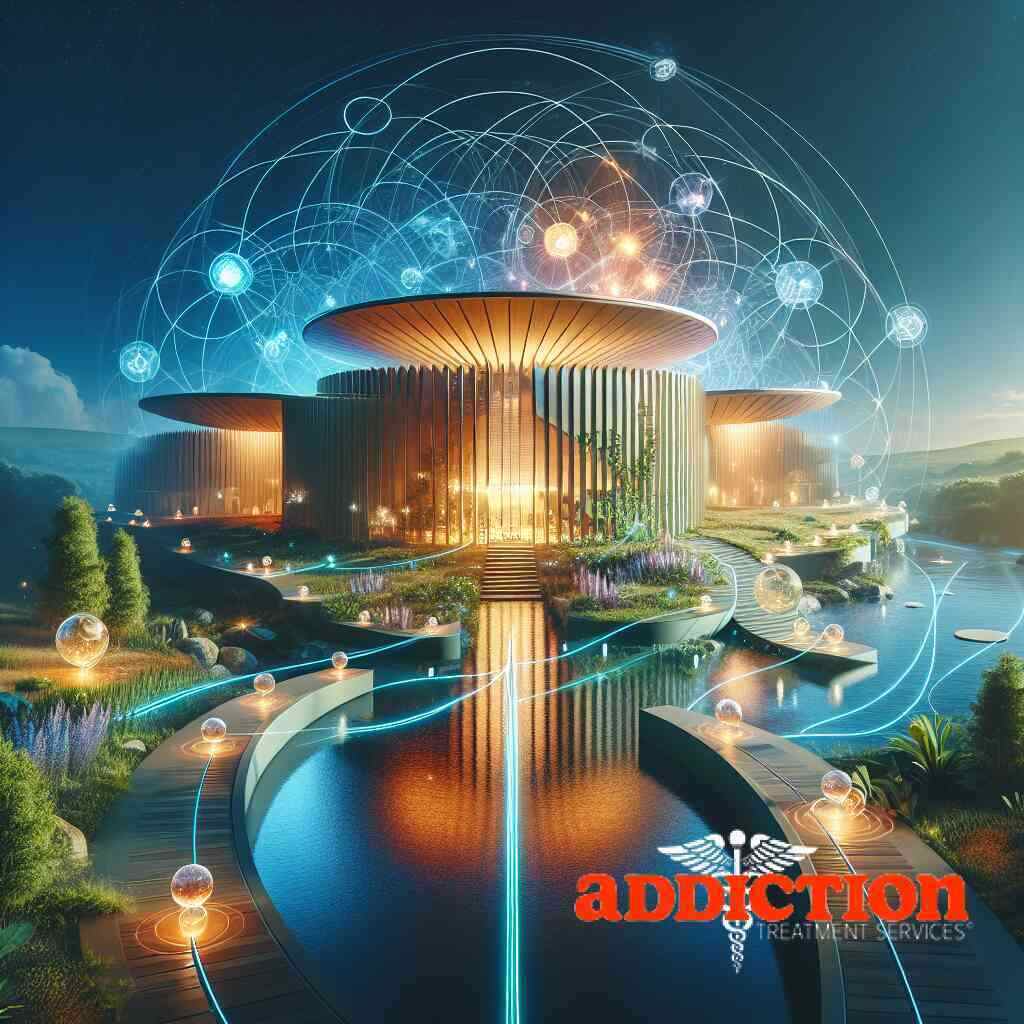 Posted On: 09/25/2025
Posted On: 09/25/2025Envisioning the Future of Addiction Treatment
Redefining Recovery: Emerging Trends in Addiction Treatment
The landscape of addiction treatment is evolving rapidly, driven by emerging trends and a deeper understanding of substance use disorders. In 2025, addiction treatment services will be more accessible and tailored to individual needs, enhancing recovery outcomes. With an increased focus on mental health and addiction integration, providers are equipping patients with holistic strategies to support their recovery journey. Additionally, the use of telehealth addiction services in 2025 is bridging geographical gaps, making quality care available to everyone, regardless of location. As we explore these developments, it becomes evident that the future of addiction recovery in California, and indeed across the nation, is shaped by a commitment to innovation and inclusivity.
From Conventional to Cutting-edge: The Evolution of Medication-Assisted Treatment
Medication-assisted treatment (MAT) has undergone significant evolution, transitioning from conventional methods to cutting-edge treatment programs. In 2025, advancements in pharmaceutical innovations for MAT have introduced new medications that target substance use disorders with unprecedented efficacy. These innovations in opioid treatment in 2025 represent a promising leap forward in reducing the devastating impact of opioid dependency. Meanwhile, treatment facilities are increasingly adopting personalized addiction recovery solutions, tailoring MAT programs to meet the unique needs of each individual. This personalized approach not only addresses the physiological aspects of addiction but also supports the emotional and psychological dimensions of recovery.
Navigating the Complexity of Substance Use Disorders in 2025
The complexity of substance use disorders demands a multifaceted response, particularly in 2025, where evidence-based addiction treatment advancements are paramount. Modern treatment centers are tackling the multifarious nature of addiction with comprehensive addiction management 2025 strategies that integrate cognitive-behavioral therapies with advanced pharmacological treatments. This dual approach resonates with the intricate realities of addiction, providing a robust framework for sustaining recovery in New York and beyond. Additionally, as withdrawal management strategies continue to advance, individuals are benefiting from safer, more effective detoxification experiences, a crucial first step in their long-term recovery journey. Through these dynamic approaches, treatment facilities are setting new standards for substance use disorder treatment evolution, offering hope and healing to countless individuals facing addiction.
Innovative Medication-Assisted Treatment Programs Shaping 2025
Pharmaceutical Breakthroughs: The Next Generation of MAT
The year 2025 heralds an era of remarkable pharmaceutical innovations for MAT, which are redefining the landscape of addiction treatment. These breakthroughs are at the forefront of developing more potent, efficient medications that target a wide array of substance use disorders, including opioid and alcohol dependencies. This evolution in medication-assisted treatment programs in 2025 showcases a dedication to enhancing therapeutic outcomes, reducing withdrawal symptoms, and supporting long-term recovery. As new medications emerge, their integration into clinical practice is guided by rigorous research and evidence-based frameworks, ensuring that individuals receive the best possible care.
Pharmaceutical advancements are not just about creating new drugs; they also focus on improving existing treatments to minimize side effects and enhance patient adherence. This dual approach ensures that individuals receive holistic care that addresses both the physical and mental facets of addiction. The next-generation MAT stands as a beacon of hope for those seeking recovery, illustrating a proactive response to the changing dynamics of substance use disorders.
Personalized Strategies: Tailoring Treatment to Individual Needs
In 2025, personalized addiction recovery solutions have become a cornerstone of effective medication-assisted treatment programs. Recognizing that addiction affects each person differently, tailored strategies are essential for addressing the unique challenges faced by each individual. Personalized treatment plans integrate various therapeutic modalities, including cognitive-behavioral therapy, dialectical behavior therapy, and motivational interviewing, to enhance recovery outcomes.
These individualized programs are designed to align with the patient’s specific circumstances, preferences, and health conditions. By focusing on personalized care, treatment facilities can enhance patient engagement and motivation, crucial elements for a successful recovery. In this context, the evolving role of genetic testing and biometrics is also noteworthy, as they provide insights that can further refine treatment plans, ensuring they are as effective and sustainable as possible.
Integrating Mental Health and MAT: Comprehensive Care Approaches
Comprehensive addiction treatment in 2025 places significant emphasis on mental health and addiction integration, acknowledging that these two aspects of health are inextricably linked. Effective medication-assisted treatment programs now routinely incorporate mental health services to provide holistic, patient-centered care. This integrated approach ensures that both mental health disorders and substance use issues are addressed concurrently, fostering a supportive environment where patients can heal and thrive.
By melding these two critical areas of care, providers are better equipped to manage co-occurring disorders, reduce relapse rates, and improve overall recovery success. Such comprehensive strategies recognize the intricate interplay between mental health and addiction, promoting synchronized treatment that enhances the patient’s quality of life. As mental health care becomes increasingly accessible, its integration with MAT continues to set new standards for comprehensive care in addiction recovery.
Dual Diagnosis Treatment: A Synergistic Approach
In the realm of advanced dual diagnosis treatment, addressing both mental health disorders and substance use disorders simultaneously has unveiled a more effective pathway to recovery. This synergistic approach acknowledges the complexity of dual diagnoses and tailors interventions to manage both conditions concurrently. Treatment centers in 2025 are equipped with the expertise and resources to offer these specialized programs, supporting individuals in their journey toward sustained recovery.
By adopting a cohesive strategy that combines medication-assisted therapy with psychological support, dual diagnosis treatment addresses the root causes and symptoms of both disorders. This comprehensive approach is pivotal in minimizing the risk of relapse and promoting long-term health and wellness. As a result, individuals experiencing dual diagnoses are finding more robust support systems, ensuring they receive the necessary tools to navigate recovery in a way that is both meaningful and sustainable.
Harnessing Technology: The Role of Telehealth in Modern Recovery
The role of telehealth addiction services 2025 in modern addiction recovery is revolutionary. This technology-driven approach expands the reach of medication-assisted treatment, offering individuals in remote locations access to vital resources and counseling services. Telehealth platforms are equipped to provide real-time consultations, follow-up care, and continuous monitoring, bridging gaps in traditional treatment access and ensuring continuous support.
Telemedicine enables a flexible, patient-centered approach that adapts to the changing needs of individuals pursuing recovery. The convenience and accessibility inherent in telehealth drive higher engagement rates, as individuals can seamlessly integrate treatment into their daily lives. This evolution represents a paradigm shift in addiction treatment, demonstrating how technology can enhance the effectiveness of recovery programs and ensure a comprehensive support system for all individuals, regardless of their geographical location.

Towards Long-Term Recovery: Refining Treatment Strategies
Beyond Initial Treatment: Sustaining Recovery through Effective Strategies
Long-term recovery from addiction requires more than just initial treatment; it demands a sustainable, ongoing strategy. In 2025, treatment facilities prioritize continuity of care by integrating comprehensive addiction management 2025. This ongoing support includes a blend of follow-up counseling, community support groups, and individualized therapy, allowing individuals to maintain their path to recovery. By fostering connections through peer support and leveraging resources like addiction treatment services, programs help mitigate the risk of relapse, ensuring patients remain committed to their recovery journey. Furthermore, advancements in relapse prevention technologies are pivotal in reinforcing sustained recovery, offering state-of-the-art solutions to preempt and address potential setbacks.
Advanced Withdrawal Management: Strategies for Lasting Success
The journey to recovery often begins with detoxification, a critical first step requiring effective withdrawal management. In 2025, modern withdrawal management strategies have evolved to enhance patient comfort and success rates significantly. These strategies are grounded in the latest pharmacological innovations, providing patients with medications that alleviate withdrawal symptoms and reduce cravings. By integrating personalized care plans, treatment centers ensure individuals receive appropriate interventions that align with their specific substance use disorder. Embracing a compassionate approach, facilities offer a safe and supportive detox environment, paving the way for smoother transitions into ongoing treatment and recovery.
Behavioral Health Trends: What 2025 Has in Store
As we move forward, understanding and adapting to behavioral health trends in 2025 is essential for effective addiction treatment. Emerging trends indicate a strong emphasis on mental health and substance use disorder integration, recognizing their interconnected nature. Mental health services are now an integral component of addiction treatment programs, supporting individuals in managing co-occurring mental health issues such as anxiety and depression. As a result, treatment plans are more comprehensive, catering to the diverse needs of individuals seeking recovery. This holistic approach underpins a broader strategy of health and wellness, aligning with the evolving landscape of behavioral health care.
Holistic Therapies: Complementary Approaches to Addiction Recovery
In 2025, holistic addiction therapies are becoming increasingly recognized for their role in supporting addiction recovery. These therapies complement traditional treatment methods, offering a diverse range of practices such as meditation, yoga, and acupuncture. By addressing the mind, body, and spirit, holistic therapies contribute to enhanced emotional balance and physical well-being, crucial components of a successful recovery journey. Treatment facilities that incorporate holistic approaches provide individualized care plans that resonate with patients on multiple levels, promoting self-awareness and fostering long-term resilience against substance use challenges.
Futureproofing Addiction Treatment: Preparing for the Challenges Ahead
As the landscape of addiction treatment continues to evolve, preparing for future challenges is paramount. In 2025, treatment centers are focusing on futureproof addiction treatment technologies to enhance treatment efficacy and accessibility. This includes the integration of telemedicine and digital health tools, which enable broader reach and continuous engagement with patients, regardless of geographical barriers. These innovations not only improve access to care but also allow for real-time monitoring and adjustments to treatment plans, ensuring that services remain responsive to individual needs. By embracing cutting-edge technologies and evidence-based practices, addiction treatment services are proactively equipping themselves to handle the complexities of future substance use trends, ensuring lasting and effective recovery solutions.
Charting New Territories: A Comprehensive Conclusion
MAT Success Stories: Lessons and Inspirations
The landscape of medication-assisted treatment (MAT) in 2025 is replete with stories of transformation and resilience. MAT success stories serve as inspiring testaments to the profound impact of medication-assisted treatment programs in 2025. These narratives shed light on the journey of individuals who have triumphed over addiction, leveraging cutting-edge therapies and personalized care strategies. Through their experiences, we glean valuable lessons about the importance of tailored interventions and the role of supportive communities in recovery. As these stories inspire others to embark on their own recovery journey, they also highlight the evolving nature of addiction treatment, emphasizing the need for compassionate and evidence-based approaches that resonate with the unique needs of each patient.
The Road Ahead: Setting New Standards in Addiction Care
As we look to the future, setting new benchmarks in addiction care is essential. The rapid advancements in MAT underscore a commitment to refining treatment methodologies, employing cutting-edge substance use disorder medication that promises more effective outcomes. The road ahead is paved with continuous innovation, guided by rigorous research and evidence-based practices. To sustain these advancements, treatment centers are embracing an integrative approach, combining medication with therapies that address mental, emotional, and social dimensions of recovery. By doing so, they are redefining the standards of care, fostering environments that nurture long-term healing and resilience for individuals facing the challenges of addiction.
An Inclusive Path Forward: Building a Supportive Network for Recovery
Building an inclusive network for recovery is crucial to ensuring that individuals have the resources and support they need to achieve lasting recovery. This inclusive path involves a collective effort from treatment facilities, community organizations, and healthcare providers to establish comprehensive support systems. By integrating mental health services, peer support, and family involvement, the recovery network becomes a robust backbone for sustaining recovery progress. Relapse prevention innovations in 2025 offer additional tools to safeguard against potential setbacks, enhancing an individual’s ability to maintain sobriety. As we strive to create a more inclusive and responsive recovery landscape, it becomes clear that cooperation and connectivity are the pillars upon which successful addiction treatment is built, ensuring a future where no individual faces the battle against addiction alone.
Frequently Asked Questions
Question: What role do cutting-edge medication-assisted treatment programs play in the future of addiction recovery in 2025?
Answer: In 2025, cutting-edge medication-assisted treatment programs are central to the evolution of addiction recovery. These innovative treatment strategies are designed to enhance the effectiveness of recovery processes by integrating both advanced pharmacological solutions and personalized care. By employing the latest in substance use disorder medication and leveraging new pharmaceutical breakthroughs, these programs significantly improve treatment outcomes for individuals battling opioid and alcohol dependencies.
Question: How does the integration of mental health services enhance medication-assisted treatment programs, according to the blog Analyzing Top Medication-Assistance Programs in 2025?
Answer: The integration of mental health services with medication-assisted treatment programs offers a holistic recovery approach. In 2025, the understanding that mental health and addiction are interconnected has led to more comprehensive care solutions. By addressing both substance use disorders and mental health conditions in tandem, treatment facilities can significantly reduce relapse rates and improve overall recovery success. This dual approach is enhanced by evidence-based treatment strategies that are both inclusive and responsive to the individual needs of patients.
Question: How have telehealth addiction services transformed access to addiction treatment services in 2025?
Answer: Telehealth addiction services have revolutionized accessibility to addiction treatment services by overcoming geographical and physical barriers that traditionally limited access. In 2025, individuals in remote or underserved locations can receive real-time consultations, continuous monitoring, and follow-up care via telehealth platforms. This technology-driven approach allows for flexible and personalized outpatient care, ensuring that patients can maintain their recovery journey while integrating treatment seamlessly into their daily lives. By expanding the reach of addiction treatment technology, telehealth assures a comprehensive support system available to everyone, regardless of location.
Question: What are some key innovative trends in withdrawal management strategies in 2025?
Answer: In 2025, withdrawal management strategies are seeing significant advancements, making the detoxification process much safer and more effective. These modern strategies utilize cutting-edge substance use disorder medication to alleviate withdrawal symptoms and cravings, facilitating a smoother transition into ongoing treatment. Personalized care plans are pivotal in ensuring that each individual’s specific needs are addressed, which is a crucial first step toward sustainable long-term recovery. This modern approach not only enhances patient comfort but also increases the overall success rate of withdrawal management, setting new standards for addiction treatment services.
Question: What role do personalized treatment strategies play in long-term recovery solutions for addiction?
Answer: Personalized treatment strategies are crucial for ensuring long-term recovery solutions in addiction management. These strategies consider the unique circumstances, preferences, and health conditions of each individual, making them more effective than one-size-fits-all approaches. By integrating cognitive-behavioral therapies and other tailored therapeutic modalities, personalized treatment enhances patient engagement and motivation. This bespoke approach, complemented by data-driven recovery programs and insights from genetic testing, provides sustainable and effective recovery pathways, ultimately reinforcing the commitment to long-term healing and wellness.



